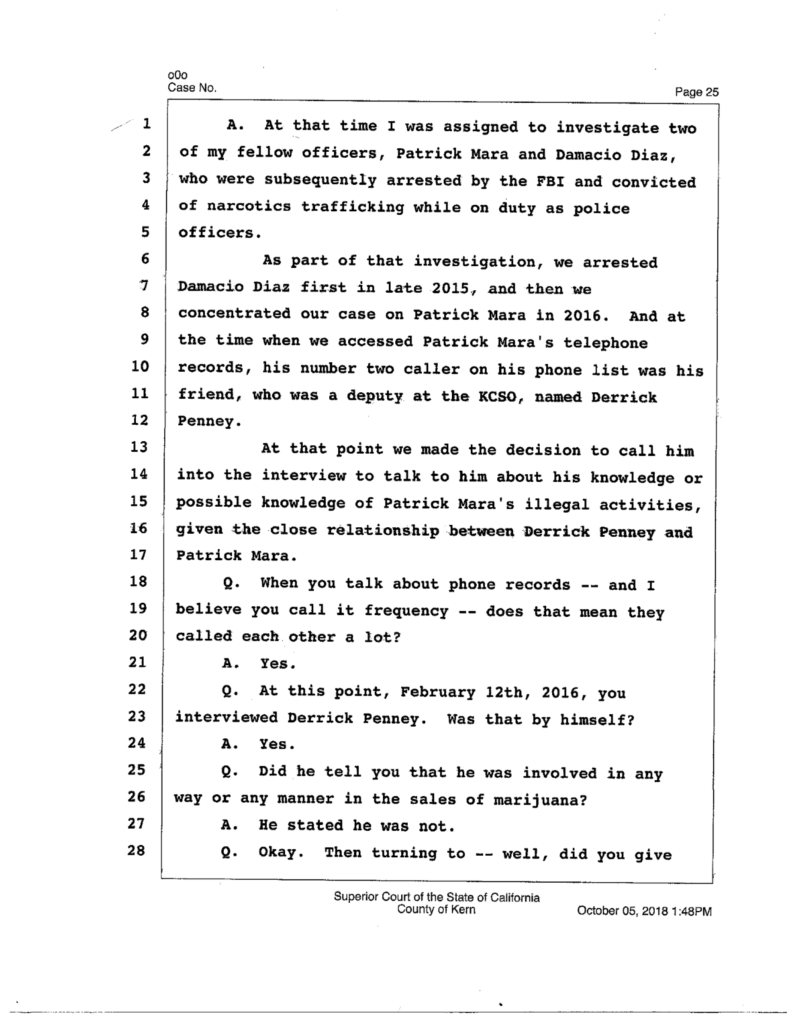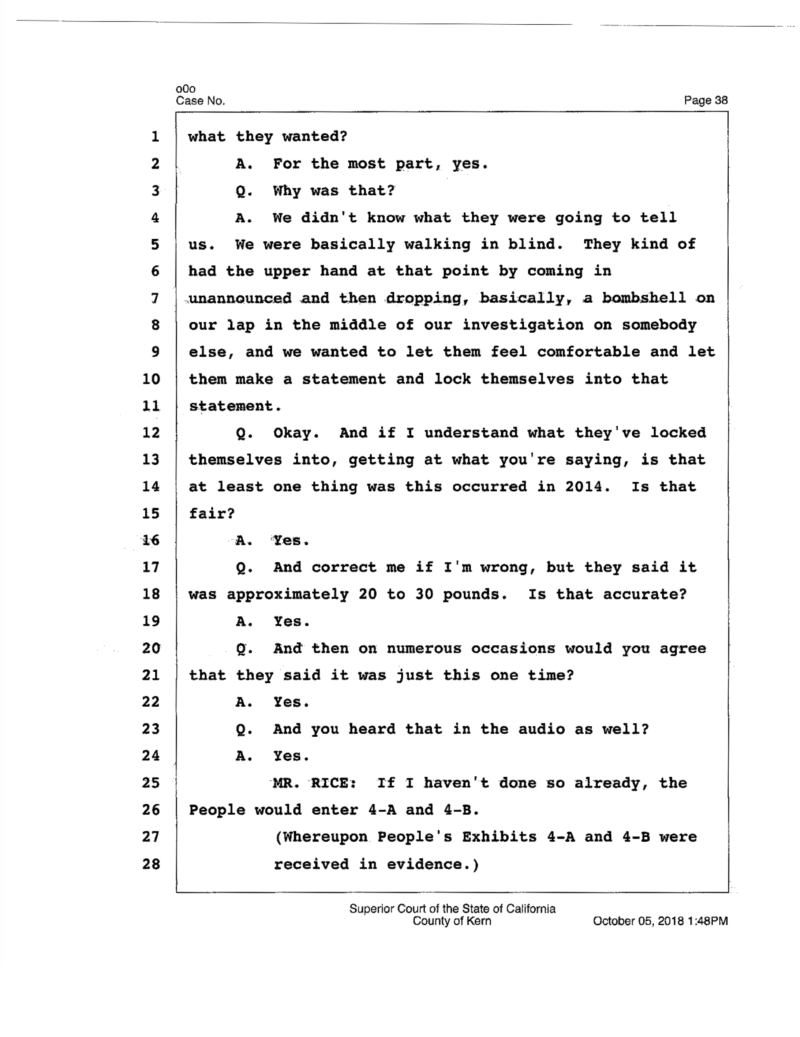Three Bakersfield-area law enforcement officers were drinking beers and grilling one summer day in 2014 when the conversation turned to a rural marijuana growing operation they’d busted. A senior Kern County sheriff’s deputy marveled at the “huge-ass freaking buds” they’d taken, that were just sitting in a storage unit at the sheriff’s office.
That was the start of one of the biggest law enforcement corruption scandals in modern Central Valley history. Within hours, the senior deputy, Derrick Penney, and another deputy on the Kern County Sheriff’s narcotics squad, Logan August, were letting themselves into a secure storage facility and walking out with thousands of dollars in marijuana.
Those are some of the details revealed in hundreds of pages of grand jury transcripts recently obtained by the California Corruption Project, a collaboration between the Investigative Reporting Program at UC Berkeley and KQED. The documents are a window into a corruption scandal that has riveted the Central Valley for nearly three years, embarrassed two prominent law enforcement agencies and caused local officials to rethink how to address the pernicious influence of the drug trade in a state with a shifting attitude toward narcotics enforcement.
“Over my career I've seen an officer alone do some pretty stupid things and sometimes illegal things but never a group of narcotics officers,” said Kern County Sheriff Donny Youngblood in a recent interview. “Usually your cream of the crop, your best of the best, go into those units. And so there was somewhat disbelief in the beginning. But shortly after the investigation started I was briefed by the FBI on some of the case. And we became a believer, quite frankly, very quickly.”
And the Kern County saga isn’t over.
In May last year, the deputies pleaded guilty in federal court to stealing about 30 pounds of marijuana. But local authorities recently uncovered evidence the crime was much bigger. They now allege the theft was closer to 400 pounds, and the local District Attorney’s Office recently took the almost unheard-of step of re-prosecuting August and Penney in state court.
A Kern County grand jury last month indicted the former deputies on multiple felonies, including burglary and conspiracy. August and Penney pleaded not guilty to the new charges.
“This is vindictive prosecution mixed with sour grapes,” said David A. Torres, August’s attorney.
Crooked Cops
The corruption scandal broke in November 2015 when federal agents arrested Bakersfield Police Detective Damacio Diaz for helping traffic methamphetamines.
Diaz was a local celebrity at the time. His life story had been portrayed in the Disney movie "McFarland, USA". But the Police Department put Diaz on administrative leave — just nine days after the film’s Bakersfield premiere.
His partner in the department, Detective Patrick Mara, was charged six months later for his role in the drug conspiracy.
Diaz and Mara ultimately pleaded guilty to crimes dating back to 2012, including lying on tax returns, taking bribes and selling meth. Both are in federal prison, serving five-year sentences.

A local businessman, Noel Carter, recently agreed to plead guilty to selling drugs for Diaz and Mara out of a Bank of America building in downtown Bakersfield, across the street from the courthouse. He’s due in federal court Monday to enter his plea.
While investigators were looking into the Bakersfield police detectives, they stumbled onto Penney and August.
An investigator in 2016 noticed that Mara frequently called a friend at the sheriff’s office, Derrick Penney. That’s according to the grand jury testimony of Bakersfield Police Detective Paul Yoon, who helped investigate his department’s corrupt officers.
Yoon told the grand jury he interviewed Penney on Feb. 12, 2016, to see if the deputy knew anything about the crimes. Penney claimed ignorance. But just two weeks later Penney showed up suddenly at the local FBI office, along with Logan August — and the two started confessing while they were still standing in the lobby.
The deputies said they had stolen 20 to 30 pounds of marijuana. Federal prosecutors charged them with that theft and they pleaded guilty in May 2017. Authorities believe they sold the drugs through the same middleman as the two disgraced Bakersfield police detectives. August and Penney no longer work for the department.
Days after pleading guilty, August posted an apology video on YouTube. Sitting next to his wife, August blamed the decision to steal the pot on “Satan playing games with me.”
The two men faced up to five years in prison but instead U.S. District Court Judge Lawrence O'Neill sentenced both to three years probation, telling August he saw "the depth of [August's] remorse" and was convinced he was sorry for what he did.
But for some in local law enforcement, the confession didn’t smell right.
More to the Story
In May 2017, after news of the charges against Penney and August broke, Kern County Sheriff Donny Youngblood formally launched an internal affairs investigation. His department has faced intense scrutiny in recent years over officer-involved shootings and questionable policing practices. Youngblood said the purpose of the investigation was to look at department policies that might need to be changed.
But, according to the grand jury transcripts, his investigators made some troubling discoveries. They found evidence that August had checked out marijuana from a county facility on multiple occasions. They also found he filed suspicious reports indicating he had destroyed the drugs.
Authorities now believe August took nearly 400 pounds of marijuana — taking it out in large green, military-style duffle bags. And they allege he falsified forms to make it look as if he had gotten rid of the drugs.

“We could have just let it die and no one would have ever known,” Youngblood said. “But I had to make sure that we have cleaned out what we know of in our organization because it impacts every other case. It impacts officer safety.”
Youngblood said his department called the FBI to let them know they “didn’t finish the job” and to ask them to come back. But the feds declined.
He wasn’t the only one to suggest there was a bigger case. Yoon, the Bakersfield police detective who helped investigate the case for federal prosecutors, told the grand jury he thought the detectives were minimizing their role and that the pre-emptive confession might have been a ruse to avoid a broader probe.
“Call it a cop’s hunch; something was not right,” Yoon told the grand jury.
He said that the U.S. Attorney’s Office ultimately decided not to dig deeper. “We were going to take what they admitted to, and we were going to prosecute them and then make sure they get a felony conviction and they can no longer be a cop in this country ever again,” Yoon said, explaining the directive from the federal prosecutors. He added that he was “very upset” with the decision to limit the investigation.
The U.S. Attorney’s Office declined to comment.
Sheriff Youngblood ultimately took the new evidence to the Kern County District Attorney’s Office, which continued the investigation. The DA brought the case to the grand jury two months ago.
Sentences Would Have Been Stiffer for Civilians
The corruption scandal has been a very public black eye for local law enforcement.
“We’ve seen across the country that citizens are not trusting our law enforcement agencies,” said Patricia Smith, a criminal justice professor at Bakersfield College. “And when these kinds of cases comes up, it just kind of makes those feelings stronger and it’s harder to break through to the community.”
She added: “the distrust — it grows even larger.”
Attorneys for August and Penney say the decision to retry the former deputies is inappropriate. They suggest local officials are piling on because the scandal was an embarrassment.
“The case was properly investigated by the government and aggressively prosecuted by the U.S. Attorney’s Office. At the time of sentencing, all parties were heard,” according to August’s attorney, David A. Torres. “An experienced and respected federal judge listened to the sentencing arguments of both parties and decided to impose the sentence he did, much to the dismay and disappointment of Sheriff Youngblood.”
Indeed, Youngblood has repeatedly said he was upset with the federal court’s decision to let the ex-deputies off without prison time. The scandal hit close to home for the sheriff, who faced questions about it during his recent successful bid for a fourth term.
“If those had been civilians they would have gotten more than straight probation,” Youngblood said.
Still, he said, the current case involves different crimes and deserves to be prosecuted. August was indicted on 15 counts, while Penney is facing seven counts in state court.
Supervising Deputy District Attorney Michael Yraceburn said the new charges have nothing to do with the the outcome of the federal case.
“There is no desire to correct the way the federal people handled their prosecution. That’s their choice,” said Yraceburn. “Our choice is that when we discover crimes, when the individual has not been held accountable, it’s our job to hold those individuals accountable.”
Sheriff Youngblood said the investigation is ongoing although he doesn’t think any other deputies will be charged criminally. He wouldn’t rule out internal discipline. August and Penney’s supervisor, a lieutenant, has been on administrative leave since May 2017.
Youngblood said he has made a number of changes to the department in the wake of the corruption scandal, including new policies for how deputies can check out evidence from storage facilities.
If you have a tip, please email reporter Robert Lewis at lewis@investigativestudios.org or call 510-643-1386.
This story is part of the California Corruption Project, a collaboration between KQED and the Investigative Reporting Program at UC Berkeley. UC Berkeley reporters who contributed research to this story include Amy Mostafa, Daniel Lempres, Casey Smith, Ali DeFazio, Edward Booth, Meg Shutzer, Ravleen Kaur, Betty Marquez Rosales, Brian Perlman, Josh Slowiczek, Susie Neilson, Aksaule Alzhan, Alyson Stamos, Eric Murphy, Andrew Beale, Sarah Trent, Ricky Rodas and Kristen Hwang.

